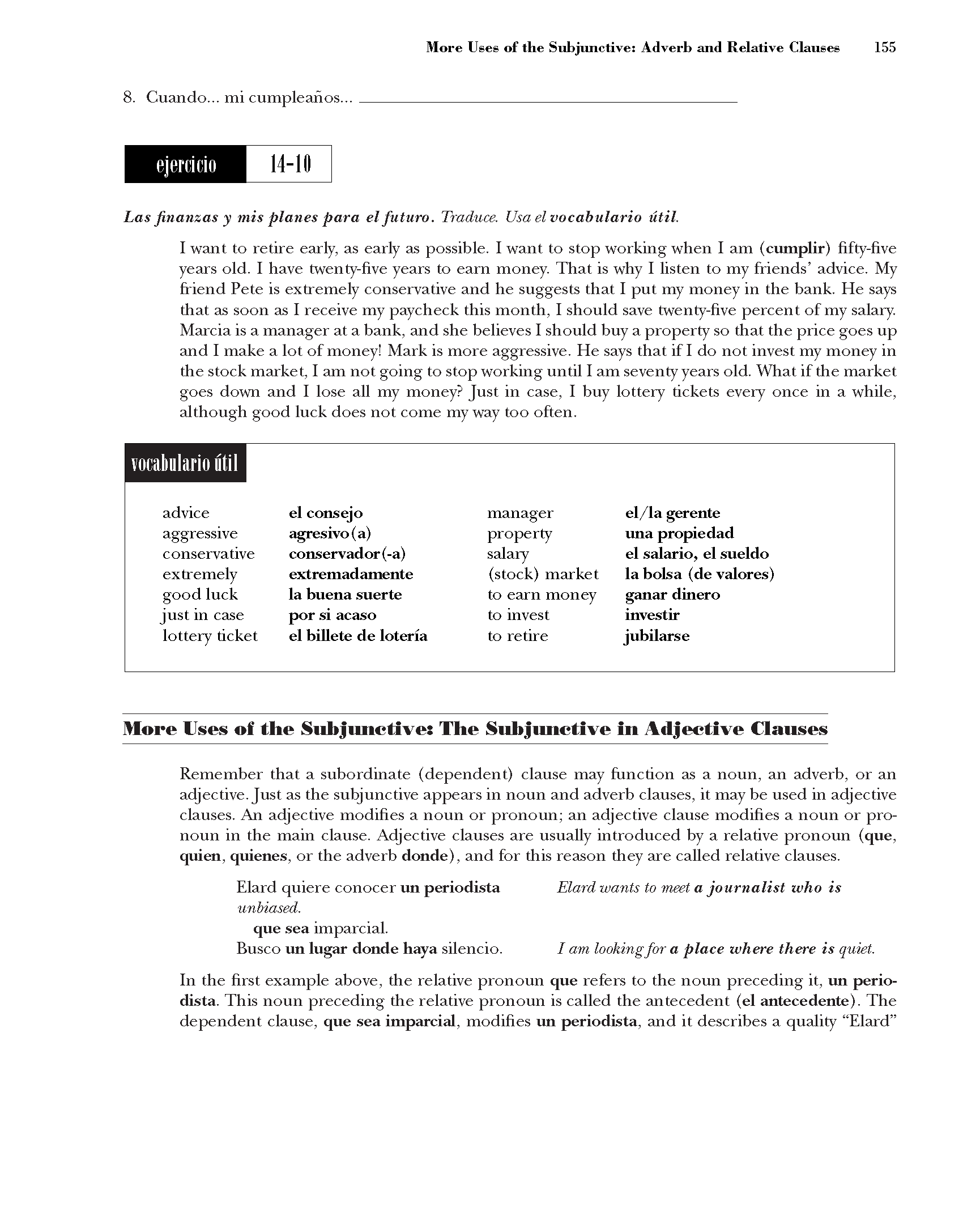CSG166

Morę Uses of the Subjunctive: Adverb and Relative Clauses
155
8. Guando... mi cumpleanos...
14-10
ejercicio
Las finanzas y mis planes para el futuro. Traduce. Usa el uocabulario util.
I want to retire early, as early as possible. I want to stop working when I am (cumplir) fifty-five years old. I have twenty-five years to earn money. That is why I listen to my friends’ advice. My ffiend Pete is extremely conservative and he suggests that I put my money in the bank. He says that as soon as I receive my paycheck this month, I should save twenty-five percent of my salary. Marcia is a manager at a bank, and she believes I should buy a property so that the price goes up and I make a lot of money! Mark is morę aggressive. He says that if I do not invest my money in the stock market, I am not going to stop working until I am seventy years old. What if the market goes down and I lose all my money? Just in case, I buy lottery tickets every once in a while, although good luck does not come my way too often.
advice aggressive conservative extremely good luck just in case lottery ticket
manager
property
salary
(stock) market to earn money to invest to retire
el consejo agresivo(a) conservador (-a) extremadamente la buena suerte por si acaso el billete de loteria
el/la gerente una propiedad el sal ario, el sueldo la bolsa (de valores) ganar dinero investir jubilarse
Morę Uses of the Subjunetive: The Suhjunetive in Adjeetive Clauses
Remember that a subordinate (dependent) clause may function as a noun, an adverb, or an adjective. Just as the subjunctive appears in noun and adverb clauses, it may be used in adjective clauses. An adjective modifies a noun or pronoun; an adjective clause modifies a noun or pro-noun in the main clause. Adjective clauses are usually introduced by a relative pronoun (que, quien, quienes, or the adverb donde), and for this reason they are called relative clauses.
Elard quiere conocer lin periodista Elard wants to meet a journalist zuho is
unbiased.
que sea imparcial.
Busco un lugar donde haya silencio. I am lookingfor a place where there is quiet.
In the first example above, the relative pronoun que refers to the noun preceding it, un periodista. This noun preceding the relative pronoun is called the antecedent (el antecedente). The dependent clause, que sea imparcial, modifies un periodista, and it describes a quality “Elard”
Wyszukiwarka
Podobne podstrony:
CSG166 Morę Uses of the Subjunctive: Adverb and Relative Clauses 155 8. Guando... mi
CSG162 Morę Uses of the Subjunctive: Adverb and Relative Clauses 151 14-4ejercicio Pareados. Luisy A
CSG160 149 Morę Uses of the Subjunctive: Adverb and Relative Clauses Leo el cuento de hadas para que
CSG162 Morę Uses of the Subjunctive: Adverb and Relative Clauses 151 14-4ejercicio Pareados. Luisy A
CSG164 153 Morę Uses of the Subjunctive: Adverb and Relative Clauses 2. She brings
CSG168 157 Morę Uses of the Subjunctive: Adverb and Relative Clauses 4. People nee
CSG170 159 Morę Uses of the Subjunctive: Adverb and Relative Clauses Saludare a Manuel dondequiera q
CSG172 161 Morę Uses of the Subjunctive: Adverb and Relative Clauses 3. Probably B
CSG159 Unit 14Morę Uses of tlie Subjunctive: Adverb and Relative ClausesThe Suhjunetive in Adve
CSG178 167 The Subjunctive Mood Past Tenses: The Imperfect and the Pluperfect SubjunctiveOther Uses
CSG134 123 Compound Tenses: The Futurę Perfect and the Conditional PerfectOne Morę Use of the Condit
57307 P1170446 172 Janusz Osioja-Zagórsk 2 Ecxmom*c At the dechnr of the Btonze Age and even morę so
więcej podobnych podstron